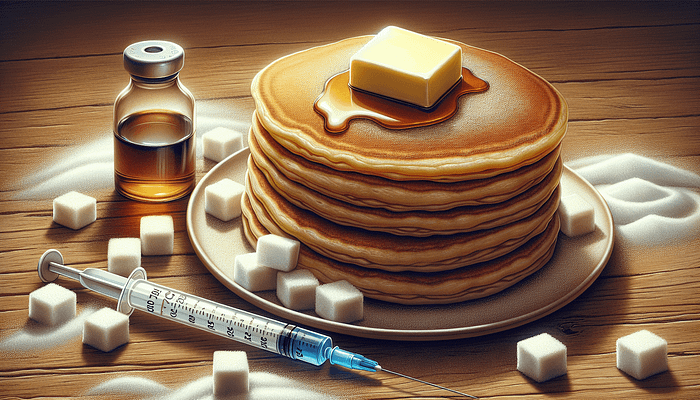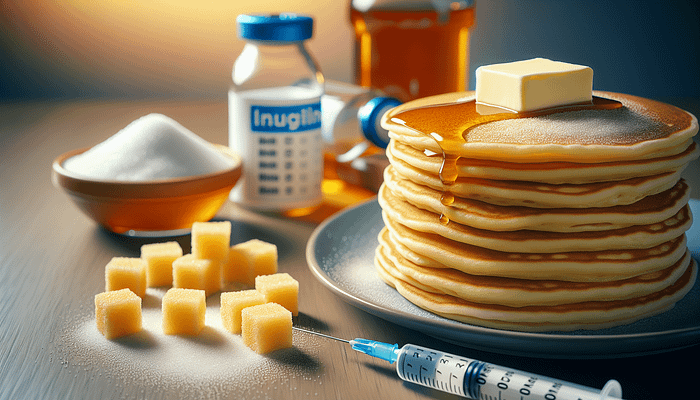The Perks and Perils of Pancakes: What Causes Diabetes
Discover the complex link between pancakes and diabetes. Uncover how lifestyle choices and indulgent breakfasts can impact your health. Stay informed and balanced.
The Perks and Perils of Pancakes: What Causes Diabetes
You know that feeling when you wake up on a Sunday morning, stretch your limbs, and catch a whiff of something magical wafting in from the kitchen? For many, that siren call is the scent of pancakes sizzling on the griddle. It’s hard to resist the allure of these fluffy, golden discs — each stack drizzled with syrup, dabbed with butter, or, if you’re feeling adventurous, topped with a smattering of fresh fruits and whipped cream. Ah, pancakes, those delightful circles of happiness. They’re the epitome of comfort food. Yet, lurking behind their joyous taste is a complex relationship with our health — one that could well lead us to diabetes.
Now, don’t get me wrong. Pancakes in themselves are not the villain in this narrative. But their role, alongside other sugary and carbohydrate-rich diets, can’t be ignored when we discuss the onset of diabetes. This whole diabetes debacle might seem like a perplexing puzzle where pancakes are just one of many pieces. So, grab a cup of coffee (or tea if that’s your jam), get comfortable, and let’s dive into the world of pancakes, sugars, and the labyrinthine pathways leading to diabetes.

What is Diabetes, Anyway?
First things first, what is diabetes? We toss the word around so casually these days, you’d think it was a trendy diet instead of a serious health condition. Simply put, diabetes is a metabolic disorder characterized by high levels of glucose (sugar) in the blood. You see, when you eat food — especially carbs — your body breaks it down into glucose. This glucose enters your bloodstream and needs to get to your cells. Insulin, a hormone produced by the pancreas, acts as a key to letting glucose into your cells to be used for energy.
If the body either doesn’t produce enough insulin or the cells become resistant to the insulin, glucose builds up in the blood. This results in what we call hyperglycemia, and over time, it can lead to serious health complications affecting the heart, kidneys, eyes, and nerves. Diabetes is generally categorized into two main types: Type 1 and Type 2.
Type 1 Diabetes
Type 1 diabetes, often diagnosed in children and young adults, is an autoimmune condition. What does that mean? Essentially, the body’s own immune system goes rogue, attacking and destroying the pancreatic cells that produce insulin. This means folks with Type 1 diabetes need to take insulin every day to keep their blood sugar levels in check. It’s not something you can outgrow or cure with lifestyle changes; it’s a lifelong condition.
Type 2 Diabetes
Type 2 diabetes, on the other hand, usually develops in adults over the age of 45, but it’s becoming increasingly more common in younger people — thanks, in part, to our pancake-infused diets (more on that in a bit). In this form, the body either doesn’t make enough insulin or the cells ignore the insulin — yeah, talk about a rude reception. Lifestyle factors, including diet and exercise, play a significant role in managing and even preventing this type of diabetes.
Pancakes, Carbs, and Sugar: A Trio of Trouble?
Why pick on pancakes, you may ask? It’s not like pancakes are whispering evil schemes from your breakfast plate. However, the typical pancake is a carbohydrate bomb, often loaded with sugars and refined flour. These ingredients spike your blood glucose levels like a rocket. Let’s break this down.
Carbohydrates: The Fuel or the Foe?
Carbs are like the fuel that your engine (i.e., body) runs on. But not all carbs are created equal. We have simple carbohydrates (found in candies, pastries, and yes, pancakes) and complex carbohydrates (found in whole grains, fruits, and vegetables). The simple ones break down quickly, causing rapid spikes in blood sugar. Imagine the steady release of energy you get from a complex carb as a slow-burning log fire, whereas a simple carb is more like throwing gasoline onto that fire — it’s intense and short-lived.
Sugar: The Sweet Saboteur
Sugars applied generously over your pancakes (think maple syrup, powdered sugar, fruity syrups) are like inviting a sweet saboteur into your metabolic machinery. Natural sugars in whole foods come with fibers, vitamins, and minerals that make the digestion and absorption process slower and more balanced. On the other hand, refined sugars found in most pancake toppings lack these benefits and lead to blood sugar spikes that make your pancreas work overtime secreting insulin.
The Path to Diabetes: A Carbo-Loaded Journey
Now, back to our beloved pancakes. Suppose pancakes aren’t a daily ritual but an occasional treat in an otherwise balanced diet. In that case, you’re probably alright. However, the story changes when foods high in refined carbohydrates and sugars become staples. Chronic high blood sugar levels stress the body’s insulin-producing machinery, eventually leading to conditions like insulin resistance and, yes, Type 2 diabetes.
Insulin Resistance: A Growing Problem
Insulin resistance is the Cranky Uncle of the diabetes family. It happens when cells in your muscles, fat, and liver start ignoring insulin’s call to action. “Open up, let the glucose in!” The cells act like they can’t hear a thing. Eventually, the pancreas amps up insulin production to compensate, trying to convince the cells to listen. It’s an exhausting process, and over time, the pancreas can wear out, leading to elevated glucose levels.
Overeating and Obesity: The Pancake Connection
Another villain in this pancake drama is overeating, leading to obesity. Obesity is a major risk factor for developing Type 2 diabetes. Those extra pancake calories can accumulate into extra body fat, particularly around the abdomen. This abdominal fat is stringent and often exacerbates insulin resistance. It’s a vicious cycle: the more insulin resistant you become, the more fat you accumulate, further increasing your insulin resistance — talk about a Catch-22!
The Genetic and Environmental Factors
Okay, we’ve made pancakes sound like the breakfast of doom. It’s important to understand that the onset of diabetes can’t solely be blamed on our fluffy friends. The road to diabetes is paved with various factors, both genetic and environmental.
Genetics: The Family Tree of Trouble
Genetics play a significant role in determining our risk of developing diabetes. If you have a close relative with Type 2 diabetes, your chances of developing the condition increase. Specific genes are linked with insulin resistance and beta-cell dysfunction. Basically, the recipe for diabetes can be handed down through generations, making some people more prone regardless of their pancake consumption.
Environmental Influences: The World We Live In
Environmental factors also pull the strings. Sedentary lifestyles, stress, poor dietary choices, and lack of physical activity contribute to the risk. This modern world we live in, bloated with processed foods and screen time, nudges us closer to diabetes without us even realizing it.

Preventing Type 2 Diabetes: Steps to Take
Alas, it’s not all doom and gloom. There are proactive steps we can take to keep diabetes at bay. Spoiler: you don’t have to renounce pancakes entirely!
Eat a Balanced Diet
A balanced diet is your first line of defense. Isaiah Berlin could very well have written “The Hedgehog and The Fox” about diets if hedged somewhere in it was the idea that balanced eating trumps all. Think of the Mediterranean diet, rich in fruits, vegetables, lean proteins, and healthy fats. Whole grains, nuts, and seeds are your friends. Reserve those pancakes for special occasions and try to make them healthier by using whole-grain flours and adding sources of protein and good fats like nuts or Greek yogurt.
Get Moving
Physical activity is like the best kind of freebie life offers. Regular exercise helps maintain a healthy weight and improves insulin sensitivity. You don’t need to hit the gym like a maniac; even a daily walk, a bit of yoga, or a recreational sport can make a big difference.
Regular Health Check-ups
But wait, there’s more! Regular check-ups can catch those early-worm trends in your blood glucose levels before they become “So You Think You Can Dance” in the diabetes arena. Early detection helps in taking timely preventative measures.
Stress Management
I know, easier said than done. But stress management techniques like mindfulness, meditation, or even a good laugh can reduce the risk of developing diabetes. Stress hormones worsen insulin resistance, so a calm mind contributes to a calm body.
Sleep Well
Never underestimate the power of a good night’s sleep. Poor sleep patterns can disturb your body’s glucose metabolism. Try maintaining a regular sleep schedule and ensure you get quality rest.
Conclusion: Pancakes Aren’t the Enemy, Moderation is Key
So there you have it — the perks and perils of pancakes in the grand scheme of diabetes. The occasional pancake indulgence isn’t a one-way ticket to diabetes land. It’s the frequent, unchecked consumption of refined carbs and sugars that can pave the path. Combine those dietary choices with lack of physical activity and genetic predisposition, and you’ve got yourself a recipe for disaster.
Keep in mind, moderation is the keyword here. Enjoy your pancakes, but be mindful of your overall lifestyle. Balance, exercise, and regular health monitoring are your best tools to avoid the pitfalls leading to diabetes.
If you found this article helpful (or just enjoyed the pancake nostalgia), please clap, leave a comment, and subscribe to my Medium newsletter for updates. Let’s journey through these curious intersections of food and health together. Cheers!
